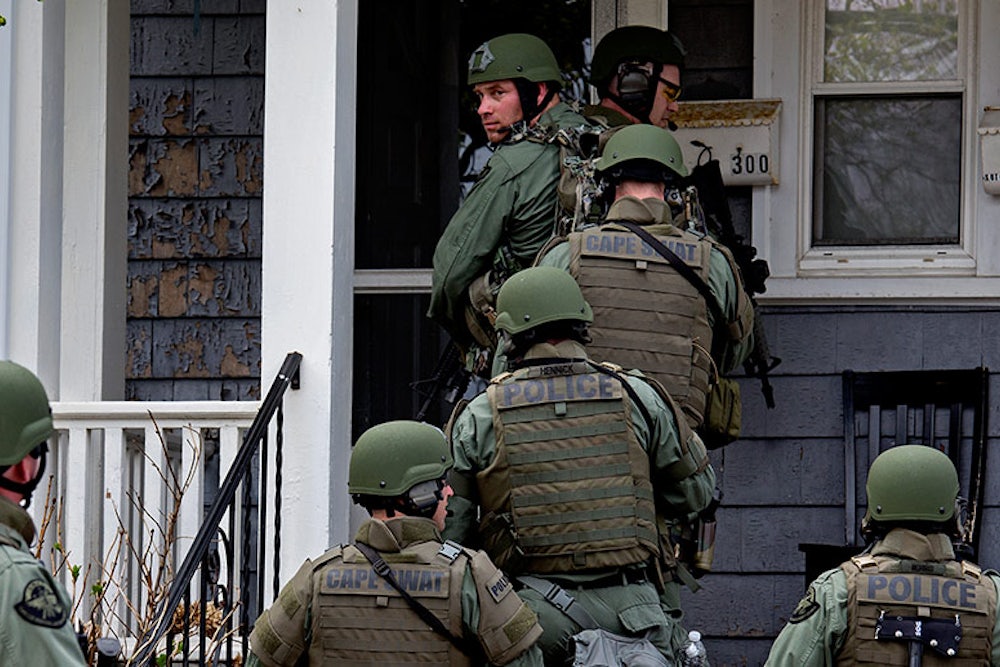We now know that the 2013 Boston Marathon bombing, which occurred a year ago this week, might have been prevented if U.S.-Russia counterterrorism cooperation had been better. Last week, The New York Times reported that although Russian intelligence officials alerted the FBI in 2011 that alleged mastermind Tamerlan Tsarnaev was a potential threat, the “Russians declined several requests for additional information.”
That occured during a "thaw" in U.S.-Russia relations. Tensions have since resumed, most recently and significantly as a result of the ongoing crisis in Ukraine. Which begs the question: Is counterterrorism cooperation between the countries even worse today?
Probably, say experts. “Even though both sides have a stake in continuing counterterrorism cooperation, each for its own set of reasons, the 'new cold war' atmosphere will undoubtedly affect counterterrorism cooperation,” says Eugene Rumer, the U.S. National Intelligence Council’s former intelligence officer for Russia and Eurasia. “Exchanges of intelligence require a closer relationship and greater mutual trust, and that's not going to happen... The relationship was never particularly close because there's always been the legacy of the cold war, and even the post–cold war period has been marked by mistrust.”
Intelligence officials say that Russia continues to cooperate with the U.S. on nuclear issues, particularly nuclear negotiations with Iran and the destruction of Syria’s chemical weapons. The U.S. and Russia continue to abide by the 2010 New Start Treaty, which mandates that they reduce their nuclear weapons delivery systems; just last week, the U.S. decreased its arsenal of nuclear bombers and ballistic missiles. Russia has been engaging in large-scale nuclear weapons tests over the past several weeks, but Russian officials say the tests were planned in December and in any case they do not violate the treaty.
But U.S.-Russia cooperation on counterterrorism—especially the increasing terrorist threat from the North Caucasus, home to several of Russia’s frozen conflicts—is another matter entirely. The U.S. has been highly critical of the methods Russia used to crack down on the Islamic militant insurgency in Chechnya, which included mass round-ups and targeted killings to curtail the threat from the region. But after the Boston bombings drew a clear link to the Caucasus—the Tsarnaev brothers’ immigrated from Dagestan, and the older brother visited the region in 2012—the two countries pledged to increase counterterrorism cooperation.
Putin’s promise to do so, however, was “almost identical to his message to President Bush after the 9/11 attacks, when Russia extended similar offers of intelligence-sharing in Afghanistan,” Brookings Senior Fellow Fiona Hill wrote at the time. A pattern has emerged: “You have these sporadic episodes when [counterterrorism cooperation] picks up spurred by specific episodes, and then it fades,” says Rumer. Even in the aftermath of the bombings, the “level of mutual mistrust [was] a significant barrier to the kind of operational information sharing that would be required in pursuing the Boston bombers Chechen connections and other potential cases,” Hill wrote. The recent revelations that Russia did not share all that it knew about the older Tsarnaev confirm that thinking.
In testimony to a House subcommittee in early April, Russia expert Andrew Kuchins said that cooperation, especially over terrorism connected to the Northern Caucasus, has worsened. “As we sit here today, it is extremely difficult to imagine that existing problems in U.S.–Russia intelligence sharing on interactions between dangerous individuals/groups in the Northern Caucasus with like-minded individuals/groups in the United States or those elsewhere who may pose a threat to the U.S. homeland will improve,” Kuchins said. Several hundred militants from the region have taken up arms with opposition forces in Syria, and Russia is rightly concerned that they will come home and continue fighting. “Now these guys are more plugged into the financial networks and training networks, and they’ve had more actual fighting experience,” Kuchins told me.
Not all experts believe intelligence sharing has been harmed by recent diplomatic tensions.
“To the extent that we may have cooperation with Russia now on counterterrorism issues, I would be surprised if it’s heavily impacted by what’s going on in Ukraine,” said former CIA Deputy Director for Intelligence John Mclaughlin. “We tend to deal with each other in compartments, if you will. Typically even during times of political strain on one issue, we can usually find, in the intelligence world, the ability to cooperate on issues in which we share some mutual interest.”
This sort of compartmentalization might be easier for Russia's authoritarian government than for the U.S., where political pressure has already forced multiple government agencies to curtail cooperation. “Even in the best of circumstances, intelligence communication is not easy. With a partner like Russia, in which there’s a lot of distrust in the relationship, that makes intelligence communication that much worse,” says Kuchins.
With CIA Director John Brennan's recent visit to Kiev, and his talk about increasing intelligence sharing with the new Ukrainian government, that distrust isn't likely to fade anytime soon.
